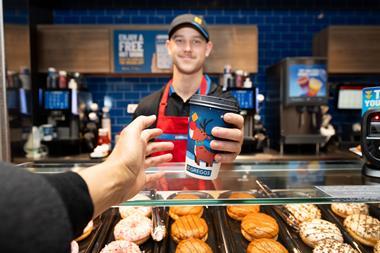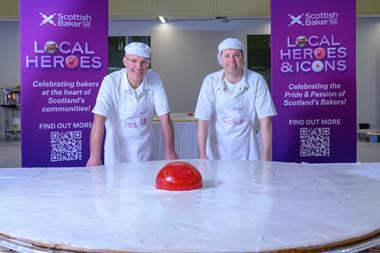It’s time to hop on the grain train. That was the overriding message from PX+ Festival last month.
The festival – which is produced by the hospitality industry, for the hospitality industry – is a three-day long celebration of food and drink, designed to offer the opportunity to celebrate, collaborate and drive change. The bakery was at the heart of this operation.
There were familiar UK faces in attendance, from British Baker’s Baker of the Year 2018Paul Rhodes to London’s E5 Bakehouse and Dusty Knuckle Bakery, as well as a host of international bakery players, such as Wing Mon Cheung from Ten Belles Bakery in Paris to Denmark’s organic grain farmer and flour miller Fintan Keenan.
It was in the bakery that they gathered to make (and break) bread, mill flour from freshly harvested grain and whip up all manner of sweet and savoury treats, from sticky cinnamon buns to buckwheat & plum cake, rich chocolate brownies and more sourdough than you can shake a stick at.
Many of these were made with non-white flours as the bakers looked to promote local grain networks and ancient grains, which bring both flavour and health benefits.
“Consumers might not care much about the slight variations in grain flavours, but they do care about moving away from white flours. These flours are the antithesis of that,” Dawn Woodward from Toronto-based Evelyn’s Crackers told British Baker at the festival. “They are a flavour component, whereas white flour is just a base for other flavours.”
She set out to prove this in the aptly named class ‘Grain as a flavour component’, during which attendees, including myself and Catherine Connor of Lovingly Artisan, helped make malted barley cookies and a buckwheat & almond torte. Honestly, I’m still not over how good that cake was.
We were encouraged to try the mixes as we went, resulting in sticky hands and big smiles as the rich, almost chocolately flavour from the barley came through, along with the toastiness of buckwheat.
Woodward also suggested mixing rye and corn together to create a “magical flavour combination”, which she demonstrated in the form of cookies.
Freshly milled grains
Festival attendees were also offered the chance to get out in the fields and see the crops. Armed with scythes and sickles, after a demonstration, everyone got stuck in and had a go at hand-harvesting. We cut it and put it into sheaves ready to be taken back to the farm.
That’s when the fun really began. Threshing – beating the wheat from the wheat heads – is usually done by a machine (to be fair, the harvesting and bundling is usually done by a combine). We took handfuls of wheat and beat it over a steel drum in what was a noisy, but ultimately therapeutic activity… although pulling grains from your hair, bra and, basically, all areas of your body was less so.
Next was winnowing (separating the wheat from the chaff), which is done through the use of hot air provided by – in this case at least – a rather ingenious contraption involving some pipe and a hairdryer.
Then it was off to the mill in the bakery for the final step before the baking. Notably, the grain we had harvested was too wet, so was either mixed with other grains or used for porridge bread.
“Freshly milled flour is delicious. It’s like using freshly ground spices – the flavour is always better,” said Luke Duffy, baker at E5 Bakehouse.
‘We need to get over our aesthetic preconceptions’
However, using alternative flours can bring technical challenges to the party due to the natural variations in crop quality.
Nottingham’s Small Food Bakery uses YQ population wheat, grown by Wakelyns Agroforestry, which is the result of a long-term project on crop population breeding in which fields are rotated to optimise biodiversity. The wheat has a low protein content and a mild, indistinct flavour.
But rather than fight against it, Small Food Bakery owner Kimberley Bell believes industry and consumers need to challenge the aesthetic preconceptions of bread. She recalled eating beautiful-looking loaves that lacked flavour and not-so-pretty bread that was delicious.
“At the smaller end of bakery, we worry a little less about technical perfection. What’s really important is that the loaf is delicious,” said Bell.
Now that’s food for thought.
































No comments yet